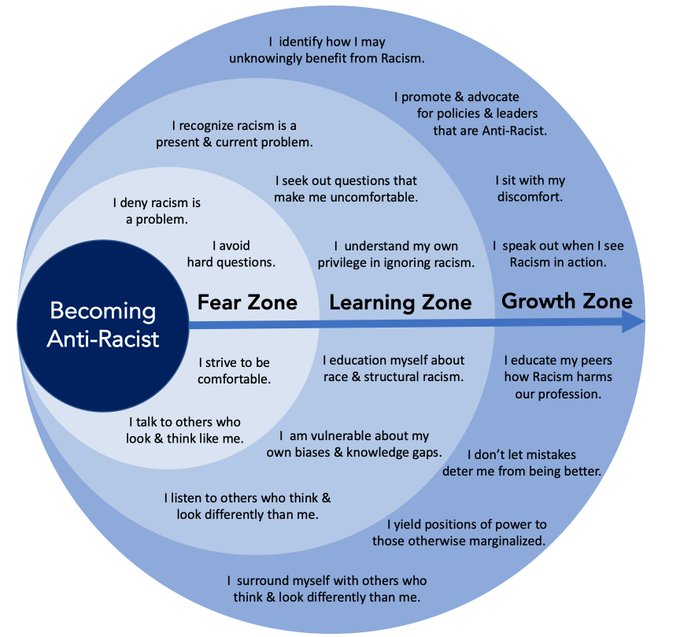Anti-Racism Resources for Libraries
This is a selection, not an exhaustive list, of resources compiled by the OLA Cultural Diversity and Inclusion Committee on the topic of ‘Anti-Racism for Libraries’. We recommend that you reach out to your public library for resources listed that you are unable to access. We trust that visitors to this page will suggest recommendations and edits they deem useful. For suggestions/recommendations, please email lkwok@accessola.com

- Canadian Race Relations Foundation’s Anti-Racism Toolkits
- Includes Reporting Hate, Finding Support – A Toolkit for Communities, Reconciliation Toolkit for Business Leaders, and Canadian Coalition of Municipalities Against Racism and Discrimination (CCMARD) Toolkit.
- What is Cultural Competency? It’s Our Time: The AFN Education Toolkit
- A guide from the Assembly of First Nations (AFN) explaining cultural competency/humility. The AFN Toolkit consists of 22 learning modules that have been designed to enhance the understanding of important First Nations topics.
- Canadian Urban Libraries Council’s Social Inclusion Audit Toolkit
- The Canadian Urban Libraries Council (CULC) developed the SIA in collaboration with the Wellesley Institute, a leading organization in health equity research. Released in 2010, the toolkit provides libraries with a structured framework to examine and improve their inclusivity, fostering stronger connections with their communities.
- Anti-Racism Toolkit – BGC (Boys and Girls Club) Canada, 2022
- The BGC Canada Anti-Racism Toolkit and Activity Guide is a comprehensive resource designed to help youth, educators, and community leaders foster inclusivity and combat racism. It includes practical tools, educational activities, and discussion guides to promote awareness, understanding, and actionable steps toward building equitable communities.
- List of Anti-Racism Resources/LibGuides from Canadian Campuses
- Concordia Anti-Black, Anti-Indigenous & Systemic Racisms LibGuide
- McMaster University Anti-Racism Resource LibGuide
- University of Victoria Anti-Racism & Anti-Oppression LibGuide
- UBC Anti-Racism Research & Resources LibGuide
- The Alberta Teacher’s Association Anti-Racism and White Privilege Resources
- Disrupting Whiteness in Libraries and Librarianship: A Reading List
- Advancing Anti-Racism in Public Libraries for Canadian Racialized Youth – Amber Matthews, 2020 Anti-Racism Toolkit
- More from Amber Matthews: Anti-Racism, Public Libraries, and Black Youth in Canada – Pathways to Prosperity: Canada, 2024
- Actively Anti-Racist Library Service, Part 1: Collection Development – Metropolitan New York Library Council, 2022
- Actively Anti-Racist Library Service, Part 2: Readers’ Advisory – Metropolitan New York Library Council, 2022
- Colour Code: A Podcast about Race in Canada
Toward Belonging and Mutual Hospitality: Decentering Whiteness in the “New Normal” – Hands, Africa (2022)
This article presents actions to be employed in an effort to transition the library to a place of belonging and hospitality for marginalized staff and community members” in post-quarantine reopenings of public libraries.
Li, Y., Kumaran, M., Cho, A., Ly, V., Fernando, S., & Miller, M. D. (2023). Reiterating visibility: Canadian librarians’ experiences of racial microaggressions via findings from a minority librarians network redux survey. International Journal of Information, Diversity, & Inclusion, 7(3/4), 1-53. https://doi.org/10.33137/ijidi.v7i3/4.40376
Based on the data from the Visible Minority Librarians of Canada 2021 Redux Survey, this study examines experiences of racial microaggressions among visible minority librarians in Canada. The test results revealed that the librarians with different personal attributes (ethnicity, disability status, gender identity, language used) and employment attributes (librarian experience, management position, library type) had significantly different encounters with eight forms of microaggression. Professional library associations and libraries must strengthen education about racial microaggressions and offer support to visible minority librarians when they are confronted with microaggressive behaviours.
Li, Y., Ly, V., & Li, X. (2023). Experiences of visible minority librarians and students in Canada from the ViMLoC mentorship program. Evidence Based Library and Information Practice, 18(4), 21-51. https://doi.org/10.18438/eblip30325
The purpose of this research is to examine the experiences of mentors and mentees in the formal mentorship program offered by the Visible Minority Librarians of Canada Network (ViMLoC) from 2018-2022. Findings from this research will help mentors and mentees understand how to establish an effective mentoring relationship. Professional library associations and libraries can also gain valuable insights to support the visible minority library professionals within their own mentorship programs.
Li, Y., Kumaran, M., Cho, A., Ly, V., Fernando, S., & Miller, M. D. (2022). Changes in the library landscape regarding visible minority librarians in Canada. Evidence Based Library and Information Practice, 17(4), 36-70. https://doi.org/10.18438/eblip30151
The 2021 survey gathered detailed information about the demography, education, and employment of visible minority librarians (VMLs) working in Canadian institutions. Data from the 2021 survey and the analysis presented in this paper help us better understand the current library landscape, presented alongside findings from the 2013 survey. The research results will be helpful for professional associations and library administrators to develop initiatives to support VMLs.
Li, Y. (2021). Racial Pay Gap: An Analysis of CARL Libraries. College & Research Libraries, 82(3), 436 https://doi.org/10.5860/crl.82.3.436
Using data from the 8Rs CARL Libraries Practitioner Survey in 2014, this study assesses the impact of race on the earnings attainment process based on a sample of 392 CARL library practitioners. It determines that there is a significant salary disparity between visible minorities and nonvisible minorities. Racial differences in job characteristics account for a larger portion of the explained racial salary gap than individual and labor market characteristics. The effect of race on salary is shown to be weaker for librarians than for support staff.
Getgen, Coreen (2022). Cultural humility in the LIS profession
This paper defines cultural competence and cultural humility in the context of library and information professionals. Though cultural competence has been the standard of late within LIS, cultural humility is an important next step for information professionals to have the ability to work with the changing multiculturally diverse population throughout the world. Through evaluation of work published within the medical and social work fields, cultural humility frameworks are discussed before describing frameworks that are applicable for information professionals. Within the paper is a list of actionable questions that professionals can answer throughout their career that look at their perception of self, fellow professionals, and the communities that they serve.
VanScoy, A. (2017). Including the Voices of Librarians of Color in Reference and Information Services Research.
Librarians of color make up a small proportion of information professionals, but their perspectives should still be included in theory and best practices. This study seeks to create an inclusive understanding of reference and information service (RIS) by exploring the experience of RIS for librarians of color. Using interpretative phenomenological analysis, the experience of RIS for eight librarians of color, from various ethnic groups and types of libraries, is analyzed. Five themes of experience emerged from the analysis: uniqueness and difference; broad range of professional skills; messiness and beauty of the human interaction; working in a web of outside forces; and learning, growth, and change. In relation to prior research, findings show that these librarians of color experience reference and information work as multifaceted and user-focused, in common with librarians in general. However, they have unique experiences of reference and information services work because of microaggressions and discrimination and because of their focus on serving as a role model or mentor.
Miroc Tonin. (2018). Do librarians discriminate? Library Journal.
“African Americans may (and often do) utilize a toolbox of coping strategies to deal with the lingering effects racial stress, which include seeking social support within one’s community (e.g., familial support), briefly limiting one’s exposure to cues of racism (e.g., signing off social media), utilizing religious or spiritual practices for comfort (e.g., prayer), seeking distraction from cues of racism (e.g., engaging in pleasurable activities), and participating in restful and relaxing activities. Also, in the aftermath of recent deaths, many African Americans nationwide have sought solace, received social support and validation, and pursued systemic change through peaceful activism. Regardless the deployed strategy, adaptively coping with racism is an ongoing, evolving process.”
- Jamison, A. (2024). Decentering Whiteness in Libraries: A Framework for Inclusive Collection Management Practices.
- Jones, S. D., & Murphy, B. (2024). Cultural humility in libraries: a call to action and strategies for success.
- Bratt, J. A., & McCurtis, K. (2022). Let’s Talk About Race in Storytimes.
- Kandiuk, M. (2020). Archives and Special Collections as Sites of Contestation.
- Este, D., Lorenzetti, L., & Sato, C. (2018). Racism and Anti-Racism in Canada.
- Kostelecky, S. R., Townsend, L., & Hurley, D. A. (2023). Hopeful visions, practical actions: cultural humility in library work.
- Jones, S. D., & Murphy, B. (2019). Diversity and inclusion in libraries: a call to action and strategies for success.
- Brissett, A., & Moronta, D. (2023). Practicing social justice in libraries.
- Qayyum, M. A., & Ryan, M. (Ed.) (2012). Designing an Intercultural Training Framework for Information Professionals.
- Jones, S. D., & Murphy, B. (Eds.). (2019). Diversity and inclusion in libraries: a call to action and strategies for success. Lanham, Maryland: Rowman & Littlefield.
- Barlow, Diane L. (2017). Celebrating the James Partridge Award : essays toward the development of a more diverse, inclusive, and equitable field of library and information science.
- Lee, D. (2014). Aboriginal and visible minority librarians : oral histories from Canada
- White, D. G. (2008). Telling histories: Black women historians in the ivory tower.
- Neely, T (2013). Diversity Now: People, Collections, and Services in Academic Libraries.
- ViMLoC: Visible Minority Librarians of Canada Network
- A network which aims to: 1. Connect and represent visible minority librarians in Canada, 2. Empower visible minority librarians of Canada by providing professional development support, 3. Engage, collaborate and support research in the area of visible minority librarianship, 4. Extend support to librarians working with multicultural users and collections
- The Black Caucus of the American Library Association
- Serves as an advocate for the development, promotion, and improvement of library services and resources to the nation’s African American community; and provides leadership for the recruitment and professional development of African American librarians.
OLA’s Commitment Towards Inclusive Librarianship (Anti-Racism Statement) (August 2024)
OLA Statement on Staff and Volunteer Participation (2019)
OLA’s Anti-Racism Statement (June 2020)


